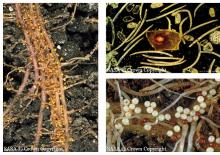The Future Threat of PCN in Scotland

Seed potatoes are an economically important commodity for Scotland with over 80% of seed production taking place here due to Scotland’s high health status. Potato Cyst Nematode (PCN) threatens to dramatically reduce the land area available for seed potato production. Of the two species present in Scotland, Globodera rostochiensis is largely under control whilst the area of land recorded as infested with G. pallida is increasing two-fold every 6-7 years. This project has: i) reviewed possible PCN interventions; ii) modelled future risks; iii) surveyed grower behaviours and attitudes to interventions; and iv) conducted an economic analysis of likely impact in Scotland based on a range of possible interventions.
Project Outcomes and Impact:
- The study determined that the most effective way to control PCN is the use of resistant varieties and that more G. pallida resistance markers are required to assist breeders.
- Practices detrimental to the control of PCN and barriers to the uptake of good practice in Scotland were identified.
- Recommendations included encouraging the use of resistant varieties in control programmes and potentially shifting rules within the legislation to benefit the management of PCN.
The report concluded that if no action is taken, and at the current rate of increase, the widespread presence of G. pallida may prohibit the production of seed potatoes on PCN-free land in as little as 30 years.
Images of PCN courtesy of SASA © Crown Copyright
